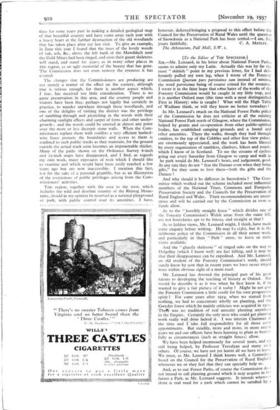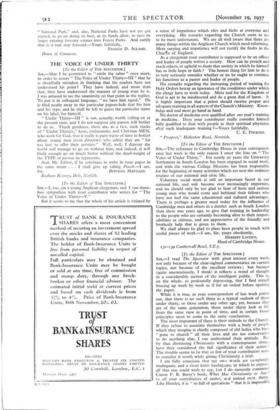[To the Editor of THE SPECTATOR.] San,—Mr. Lennard, in his
letter about National Forest Parks, seems to admire only my Latin. Actually this was by far the most " skittish "-• point in my previous letter, for I had deli- berately pulled my own leg, when I wrote of the Forestry Commission Quorum pars parvissima sum instead of minima, the word parvissima being of course coined for the occasion. I wrote it in the faint hope that soIne hater of the works of the Forestry Commission would be caught in my little trap, and it is another Oxford man (this time with a most distinguished First in History) who is taught ! What will the High Table of Waciham think, or will they know no better nowadays ?
In Mr. Leonard's attack on the National Forest Parks policy of the Commission he does not criticise at all the existing National Forest Park north of Glasgow, where the Commission, helped by grants and co-operation from other public-spirited bodies, has established camping grounds and a hostel and other amenities. There the walks, though they lead through conifers, to the top of the Cobbler and other fine view points, are enormously appreciated, and the work has been blessed by every organisation of ramblers, climbers, hikers and youth; which I know of in Scotland. To see the streams of cyclists going out every Saturday from Glasgow to camp and walk in he park would do Mr. Lennard's heart, and judgement, good. At any rate they do not " fear the Danaae even when they bring gifts," for they seem to love them—both the gifts and the Danaae !
And why should it be different in Snowdonia ? The Com- mittee which worked out the scheme included most influential members of the National Trust, Commons and Footpaths Preservation Society and the Councils for the Preservation of Rural England and Wales. Their recommendations are unani- mous and will be carried out by the Commission as soon as funds allow.
As to the " horribly straight fence " which divides one of the Forestry Commission's Welsh areas from the outer hill, are not boundaries apt to be fences, and straight at that ?
As to hidden views, Mr. Lennard might, I think, have made some enquiry before writing.- He may to sight, but it is the deliberate policy of the Commission in all their newer work, and partiCularly in 'their " Park" areas,' to leave or make views available: And the " ghastly skeletons " of ringed oaks on the way to Dolgelley (which I know well) are fast falling, and it may be that their disappearance can be expedited. And Mr. Leonard, an old student of the Forestry Commission's work, should surely know by now that in recent years we have never ringed trees within obvious sight of a main road.
Mr. Leonard has devoted the principal part of his great talents to developing the teaching of history at Oxford. But would he describe it as it was when he first knew it, if he wanted to give a fair picture of it today ? Might he not give the Forestry Commission a little credit for his own progressive spirit ? For some years after 1919, when we started from nothing, we had to concentrate wholly on planting, and the Gwydyr forest which he mainly criticises was acquired in 1920. The was no tradition of real amenity planting • anywhere in the Empire. Certainly, the only men who could get planting work really will done lacked it. .I was interim Chairman at the time and r fake full responsibility for all those early appointments. But steadily, more and more, in more recent years we and our officers have been learning to plant as beauti- fully as circumstances (such as straight fences) allow.
We have been helped enormously for several years, and are still being helped, by Professor Trevelyan and many such others. Of course, we have not yet learnt all we have to learn. We meet, as Mr. Leonard I think knows well, a Committee based on the Council for the Preservation of Rural England whenever we or they feel that they can specially help us.
And, as to our Forest Parks, of course the Commission doe' not intend to call planting ground which it may acquire in the future a Park, as Mr. Lennard suggests. It intends whereverthere is real need for a park which cannot be satisfied by a
" National Park," and, alas, National Parks have not yet got started, to go on doing its best, as its funds allow, to turn its larger existing forestry estates into Forest Parks. And surely that is a real step forward.—Yours faithfully, House of Commons. FRANCIS D. Act

















































































































 Previous page
Previous page